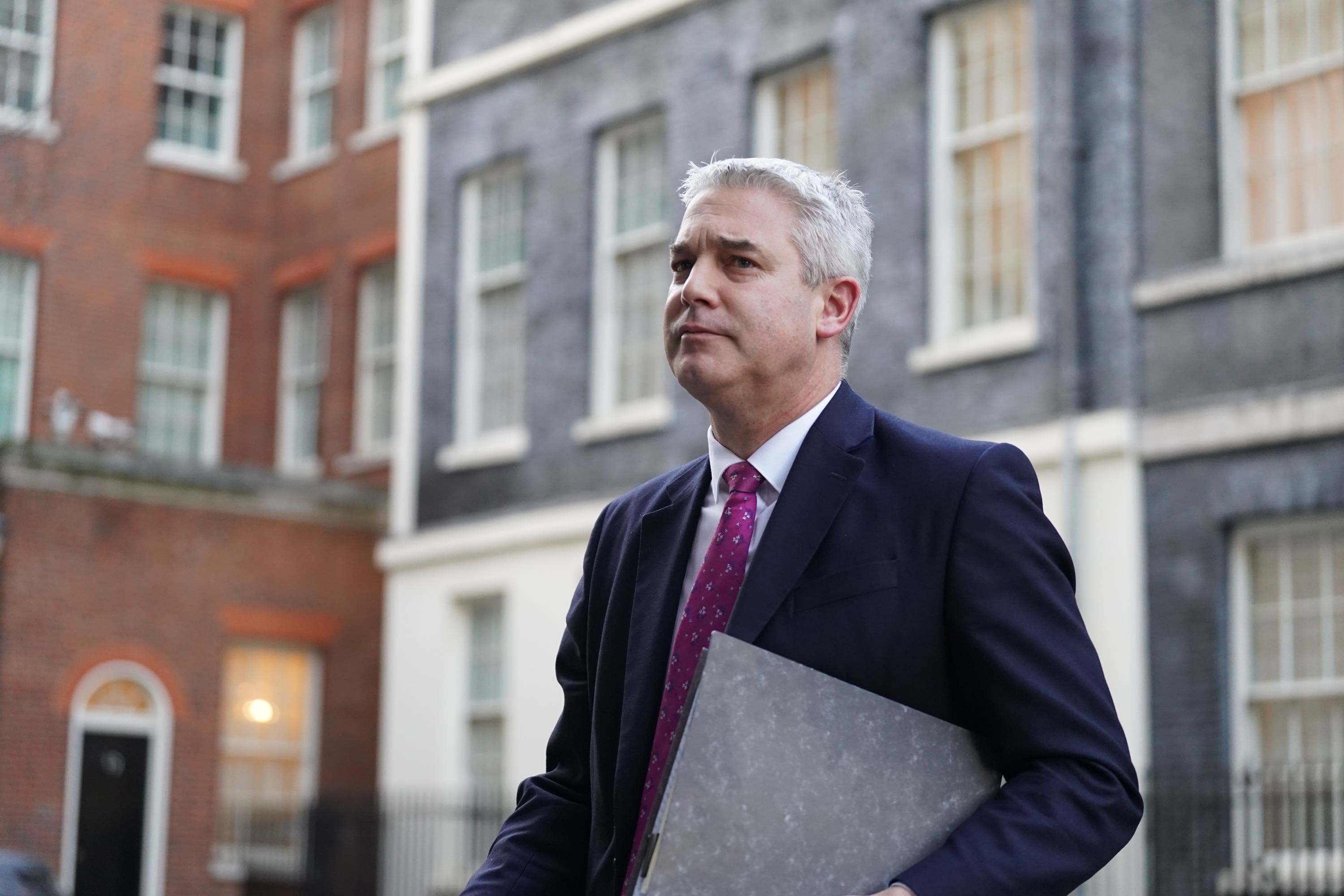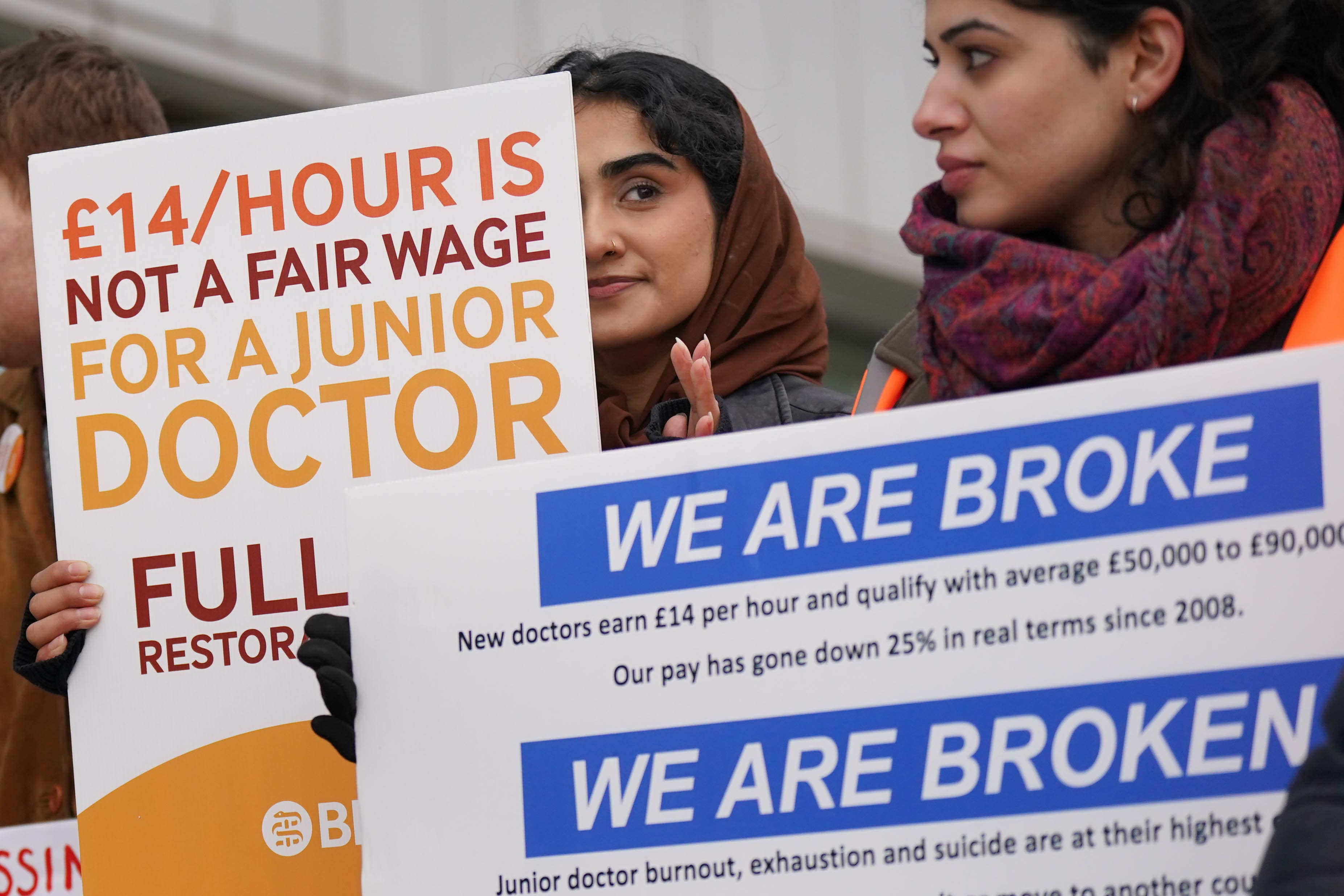Health secretary accuses union of ‘militant stance’ in row over junior doctors’ pay
Post-Easter weekend strikes will cause ‘unparalleled levels of disruption’, medical director warns
Your support helps us to tell the story
From reproductive rights to climate change to Big Tech, The Independent is on the ground when the story is developing. Whether it's investigating the financials of Elon Musk's pro-Trump PAC or producing our latest documentary, 'The A Word', which shines a light on the American women fighting for reproductive rights, we know how important it is to parse out the facts from the messaging.
At such a critical moment in US history, we need reporters on the ground. Your donation allows us to keep sending journalists to speak to both sides of the story.
The Independent is trusted by Americans across the entire political spectrum. And unlike many other quality news outlets, we choose not to lock Americans out of our reporting and analysis with paywalls. We believe quality journalism should be available to everyone, paid for by those who can afford it.
Your support makes all the difference.Health secretary Steve Barclay has accused a union of taking a “militant stance” to negotiations over pay for junior doctors as medics prepare to strike for four days next week.
Mr Barclay described the salary demands by the British Medical Association (BMA) as “unrealistic” at a time when the country faced “considerable” economic pressures and sky-high inflation.
Nearly 50,000 junior doctors are due to walk out between 6.59am on 11 April and 6.59am on 15 April in what threatens to be one of the most disruptive strikes in the NHS’s history.
Professor Stephen Powis, the health service’s medical director, warned he was “very concerned” about the strikes, which he said would cause “unparalleled levels of disruption”.
The BMA, representing junior doctors, has said it would call off the action if the health secretary put a “credible offer on the table”.
Junior doctors have demanded a 35 per cent pay rise to make up for what they described as 15 years of below-inflation wage rises.

In their dispute with the government, nurses in England initially asked for an inflation-busting rise of 17.5 per cent before agreeing to consider a one-off payment this year and a 5 per cent increase next year.
Writing in The Sunday Telegraph, Mr Barclay blamed the BMA for the breakdown in talks between the two parties, saying the union’s demands had prevented “serious talks over pay”.
Mr Barclay said he “valued the important work these doctors do every day” but that their pay demands were “widely out of step with pay settlements in other parts of the public sector at a time of considerable economic pressure on our country”.
He said: “Unfortunately, the decision by BMA junior doctors’ leaders to maintain an unrealistic position meant we were unable to make progress with talks.
“It seems they are intent on maintaining a militant stance rather than working with the government and NHS management to meet the best interests of their members and of patients.”
A salary hike of this size would see some junior doctors receiving more than an extra £20,000 a year, he claimed.

Next week’s strikes are taking place immediately after the Easter bank holiday weekend – a move the health secretary said was “timed to cause maximum disruption”.
Some hospitals face nearly 100 hours without up to half of their medical workforce while up to a quarter of a million appointments and operations could be postponed.
“This next round of strikes will see unparalleled levels of disruption, and we are very concerned about the potential severity of impact on patients and services across the country,” Professor Powis said.
“This time the action immediately follows a four-day bank holiday weekend, which is already difficult as many staff are taking much-needed holiday, and it will be more extensive than ever before with hospitals facing nearly 100 hours without up to half of the NHS medical workforce.”
He said the NHS would continue to prioritise emergency, critical and neonatal care, as well as maternity and trauma services, but inevitably hundreds of thousands of appointments, including in cancer care, would need to be postponed again.
Speaking to Sky News on Easter Sunday, Professor Powis said he had asked hospitals to contact in advance patients whose appointments will be cancelled or rescheduled.
“If you haven’t been contacted then do turn up as usual because we wil be keeping some services running despite the widespread cancellations,” he said.
When asked if he worried that patients would be endangered next week, Professor Powis added: “Our aim is to ensure that doesn’t happen. That’s why we are prioritising those emergency services.
“We’re working closely with consultants and of course we’ll be talking to the BMA throughout the four days as we did during the three-day industrial action a few weeks ago. We won’t hesitate to raise concerns with the BMA if we see services that we think are becoming unsafe.”
Dr Layla McCay, director of policy at the NHS Confederation, said the figure could be as much as 250,000 postponed appointments and operations and that health bosses were more concerned about the impact of this latest walkout than any other strike so far amid fears over patient safety.
She told BBC Radio 4’s Today programme: “In the last junior doctors’ strike we saw about 175,000 appointments and operations having to be postponed.
“In terms of the disruption that we’re anticipating this time, we reckon it could be up to about a quarter of a million so that is a huge amount of impact for patients up and down the country.”
She added: “What we’re hearing from our members who are health leaders across the whole system is that they are more concerned about this than they have been about any other strike.
“They think that the impact is going to be so significant that this one is likely to have an impact on patient safety, and that is a huge concern for every healthcare leader.”
Dr Vivek Trivedi, co-director of the junior doctors committee at the BMA, said on Saturday that Mr Barclay is yet to put a serious offer on the table.
“All we’re asking for is a credible offer that shows us he’s serious, that we can start a path of negotiations to try to address the real-terms pay cut,” he said.
Dr Mike Greenhalgh, deputy co-chair of the BMA’s junior doctors committee, told BBC One’s Breakfast: “It’s hard to negotiate when only one side is doing it and we’re not getting anything back from the government on that front.”
He added: “We’re happy to meet at any time. We would still meet him over the bank holiday weekend before the industrial action next week.
“And if he was to bring a credible offer to us, it could still, even at this late stage, avert action.”
Dr Greenhalgh apologised to patients who have had operations or appointments cancelled and insisted patient safety would not be put at risk.



